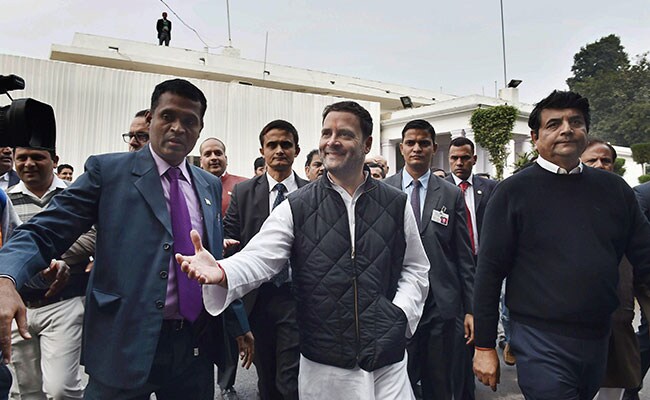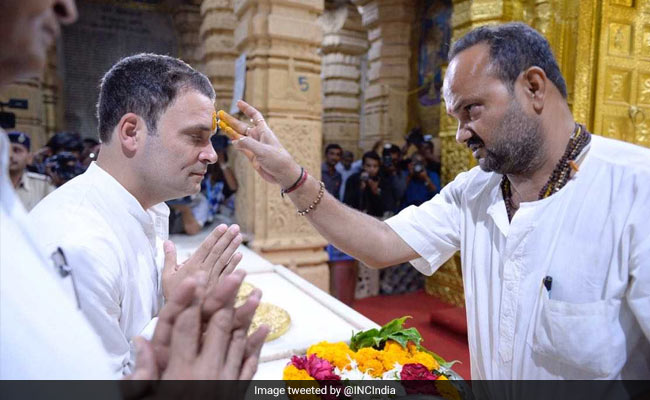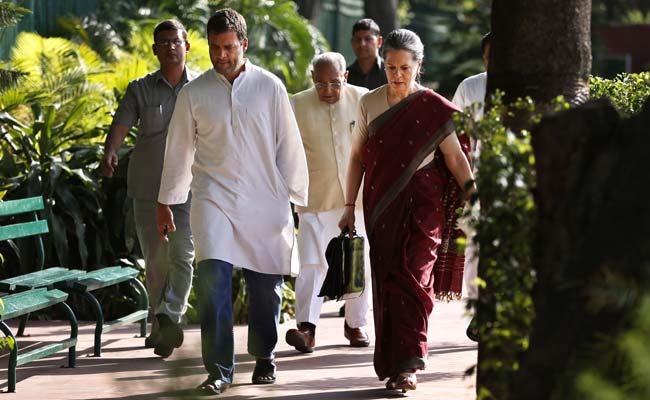
Rahul Gandhi's elevation comes amid a cloud of allegations about "dynastic rule" in the Congress.
New Delhi:
After years of clamour from adoring Congress leaders, Rahul Gandhi is finally poised to take over the reins of India's oldest political party and shoulder the hopes of its rejuvenation. The 47-year-old was elected unopposed today as there was none to challenge his elevation. His mother Sonia Gandhi, who has led the party for 19 years, was the first to nominate him.
Mr Gandhi's elevation comes amid a cloud of allegations about "dynastic rule" in the Congress, a party hard-wired to expect generations of Nehru-Gandhis to lead it. On the eve of the nominations, some opposition came from a party leader in Maharashtra. Shehzad Poonawalla alleged that the party's organisational election was a sham, since Rahul Gandhi enjoys an "unfair advantage" and he should resign his post as the party's vice president to level the field.
Rahul Gandhi is the great grandson of India's first Prime Minister, the grandson of its first woman Prime Minister, the son of its youngest Prime Minister and also of the party's longest-serving chief, Sonia Gandhi. Congressmen expect him to head the party and be India's Prime Minister one day.
Even so, Mr Gandhi, since his since his political debut in 2004, has been perceived as a reluctant politician. Critics have attributed the Congress' debacle in the 2014 national election, when it could win only 44 Parliament seats, the least ever, to what they called Mr Gandhi's lack of leadership skills and he has also been blamed for the party's loss in state after state election since. His frequent vacations and absence during crucial moments for the party have been highlighted by the BJP, whose members and supporters have also lampooned Mr Gandhi on social media.
 Rahul Gandhi's visit to Berkeley in the US this year somewhat changed the script. In his address, he said he has been the victim of false propaganda, that there was a huge machinery devoted to trolling him and it was helmed by the people running the nation.
Rahul Gandhi's visit to Berkeley in the US this year somewhat changed the script. In his address, he said he has been the victim of false propaganda, that there was a huge machinery devoted to trolling him and it was helmed by the people running the nation.
On the occasion, he had also said that he was "absolutely ready" to take charge of the party. He acknowledged that a "certain arrogance" had crept into the Congress and took responsibility for what he called a couple of years of lost opportunities from 2012.
Since then, the Congress has witnessed a turnaround of sorts and is seen as putting up a spirited fight in BJP-ruled Gujarat, where assembly elections start on Saturday.
Rahul Gandhi has been leading the charge - his repeated temple visits and cheeky tweets have irked the BJP enough for top party leaders to comment sharply on them. Mr Gandhi has also crafted an alliance with Hardik Patel, the face of Gujarat's Patidar agitation for quotas in jobs and education. The move is seen as politically shrewd, since 24-year-old Mr Patel has vowed to bring about the defeat of the BJP. That's not all. Mr Gandhi has also roped in other caste leaders, like Dalit leader Jugnesh Mewani and Alpesh Thakor, a leader of the Other Backward Castes.
 But more than the Gujarat election, the bigger task that Mr Gandhi faces is refurbishing the party machinery from the grass-root level in time for the 2019 Lok Sabha election.
But more than the Gujarat election, the bigger task that Mr Gandhi faces is refurbishing the party machinery from the grass-root level in time for the 2019 Lok Sabha election.
Mr Gandhi's mother Sonia Gandhi had taken charge of the party when it was at its lowest - in 1998, when the party had been reduced to 114 seats in the Lok Sabha. That figure came down to just 44 in 2014, which meant that the Congress, as the main opposition party could not even get the post of Leader of Opposition, because it did not have one-tenth of the total seats in the house.
After she took over, Ms Gandhi had led the Congress to power in 14 states within a year. The number of Congress-ruled states has now shrunk to six.
Much of it has been attributed to the disintegrating party machinery of the Congress. The rest to what former Congressmen like Himanta Biswa Sarma -- the Assam leader who joined the BJP - have called Mr Gandhi's caprice and arrogance.
There have also been persistent question marks over Mr Gandhi's ability to translate his personal charisma and ideas for the party into votes when it matters.
 In 2017 in an alliance with Uttar Pradesh Chief Minister Akhilesh Yadav, Mr Gandhi was unable to post significant gains in Uttar Pradesh - a one-time Congress stronghold that he had chosen as the centre-piece of his electoral agenda.
In 2017 in an alliance with Uttar Pradesh Chief Minister Akhilesh Yadav, Mr Gandhi was unable to post significant gains in Uttar Pradesh - a one-time Congress stronghold that he had chosen as the centre-piece of his electoral agenda.
Since the BJP's victory in the Lok Sabha elections, the Congress has lost power in Maharashtra, Rajasthan, Assam, Haryana, Kerala and Delhi. The Grand Alliance it had been a part of in Bihar, was also ended by Nitish Kumar this year. In Mr Gandhi's constituency Amethi, the party lost 8 of 10 seats in the assembly elections.
His supporters insist that he must be credited with initiating reforms in the party -- such as elections to the youth Congress, corporate-style interviews for selection to the party, and pushing for democratisation in the Congress. Veterans and young guns say they are sure Mr Gandhi is the man to galvanise the party. They credit him with promoting young faces in the Congress and his close aides say he has detailed political knowledge and is a practised backroom operator.
On his elevation, former Prime Minister Manmohan Singh, whom Mr Gandhi met early this morning to seek his blessings, said, "Rahul Gandhi is a darling of the Congress and he will carry forward the great traditions of the party".
Mr Gandhi's elevation comes amid a cloud of allegations about "dynastic rule" in the Congress, a party hard-wired to expect generations of Nehru-Gandhis to lead it. On the eve of the nominations, some opposition came from a party leader in Maharashtra. Shehzad Poonawalla alleged that the party's organisational election was a sham, since Rahul Gandhi enjoys an "unfair advantage" and he should resign his post as the party's vice president to level the field.
Rahul Gandhi is the great grandson of India's first Prime Minister, the grandson of its first woman Prime Minister, the son of its youngest Prime Minister and also of the party's longest-serving chief, Sonia Gandhi. Congressmen expect him to head the party and be India's Prime Minister one day.
Even so, Mr Gandhi, since his since his political debut in 2004, has been perceived as a reluctant politician. Critics have attributed the Congress' debacle in the 2014 national election, when it could win only 44 Parliament seats, the least ever, to what they called Mr Gandhi's lack of leadership skills and he has also been blamed for the party's loss in state after state election since. His frequent vacations and absence during crucial moments for the party have been highlighted by the BJP, whose members and supporters have also lampooned Mr Gandhi on social media.

Rahul Gandhi made his political debut in 2004
On the occasion, he had also said that he was "absolutely ready" to take charge of the party. He acknowledged that a "certain arrogance" had crept into the Congress and took responsibility for what he called a couple of years of lost opportunities from 2012.
Since then, the Congress has witnessed a turnaround of sorts and is seen as putting up a spirited fight in BJP-ruled Gujarat, where assembly elections start on Saturday.
Rahul Gandhi has been leading the charge - his repeated temple visits and cheeky tweets have irked the BJP enough for top party leaders to comment sharply on them. Mr Gandhi has also crafted an alliance with Hardik Patel, the face of Gujarat's Patidar agitation for quotas in jobs and education. The move is seen as politically shrewd, since 24-year-old Mr Patel has vowed to bring about the defeat of the BJP. That's not all. Mr Gandhi has also roped in other caste leaders, like Dalit leader Jugnesh Mewani and Alpesh Thakor, a leader of the Other Backward Castes.

Congress leader Rahul Gandhi at the Somnath Temple in Gujarat
Mr Gandhi's mother Sonia Gandhi had taken charge of the party when it was at its lowest - in 1998, when the party had been reduced to 114 seats in the Lok Sabha. That figure came down to just 44 in 2014, which meant that the Congress, as the main opposition party could not even get the post of Leader of Opposition, because it did not have one-tenth of the total seats in the house.
After she took over, Ms Gandhi had led the Congress to power in 14 states within a year. The number of Congress-ruled states has now shrunk to six.
Much of it has been attributed to the disintegrating party machinery of the Congress. The rest to what former Congressmen like Himanta Biswa Sarma -- the Assam leader who joined the BJP - have called Mr Gandhi's caprice and arrogance.
There have also been persistent question marks over Mr Gandhi's ability to translate his personal charisma and ideas for the party into votes when it matters.

Rahul Gandhi filed nomination today to take over as Congress President from mother Sonia Gandhi.
Since the BJP's victory in the Lok Sabha elections, the Congress has lost power in Maharashtra, Rajasthan, Assam, Haryana, Kerala and Delhi. The Grand Alliance it had been a part of in Bihar, was also ended by Nitish Kumar this year. In Mr Gandhi's constituency Amethi, the party lost 8 of 10 seats in the assembly elections.
His supporters insist that he must be credited with initiating reforms in the party -- such as elections to the youth Congress, corporate-style interviews for selection to the party, and pushing for democratisation in the Congress. Veterans and young guns say they are sure Mr Gandhi is the man to galvanise the party. They credit him with promoting young faces in the Congress and his close aides say he has detailed political knowledge and is a practised backroom operator.
On his elevation, former Prime Minister Manmohan Singh, whom Mr Gandhi met early this morning to seek his blessings, said, "Rahul Gandhi is a darling of the Congress and he will carry forward the great traditions of the party".
Track Latest News Live on NDTV.com and get news updates from India and around the world

